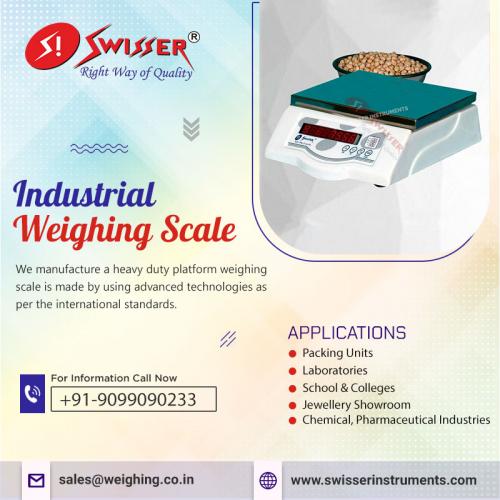What is Industrial Weighing Scales? Explain its various types

The need to measure weight reliably is a constant, whether in manufacturing, logistics, or food production. This is where Industrial Weighing Scales come into play, serving as valuable tools for businesses across various sectors. But not all scales are created equal; there are many types available, each tailored to specific needs. Let's go through the diverse world of industrial weighing scales and explore their uses for more clarity!
Bench Scales
Bench scales are frequently utilized in a variety of industries because of their versatility. They're typically placed on a bench, table, or any flat surface for weighing items that can be easily lifted by hand. Their capacity varies, ranging from a few grams to several kilograms. Ideal for small to medium-sized items, bench scales find applications in shipping, packaging, and portion control in food production.
Floor Scales
Floor scales are heavy-duty weighing instruments designed to withstand large loads. They're often used in warehouses, distribution centers, and freight terminals for weighing pallets, crates, and bulk items. With capacities ranging from several hundred kilograms to several tons, floor scales or Weighing Machines ensure accurate measurement of heavy goods, facilitating efficient logistics operations.
Counting Scales
Counting scales are specialized instruments used for counting large quantities of identical items based on their weight. They're commonly employed in inventory management, parts counting, and packaging processes. By weighing a sample of items and extrapolating the count, counting scales streamline inventory control and eliminate the need for manual counting, thereby reducing errors and saving time.
Crane Scales
Crane scales are designed for weighing heavy and oversized objects suspended from a crane or hoist. They're indispensable in industries such as construction, shipping, and manufacturing, where accurate measurement of lifted loads is crucial for safety and compliance. With rugged construction and wireless capabilities, crane scales enable efficient weighing in challenging environments.
Tank Scales
Tank scales, also known as hopper scales or tank weighing systems, are used for measuring the weight of liquids, gases, and bulk materials stored in tanks or silos. They play a vital role in industries like agriculture, chemical processing, and oil refining, where precise measurement of fluid or granular substances is essential for production and inventory management.
Railroad Scales
Railroad scales are massive weighing platforms installed along railway tracks to weigh entire railcars and their contents. They're crucial for determining freight charges, ensuring compliance with weight regulations, and preventing overloading of trains. By accurately measuring the weight of rail shipments, railroad scales contribute to the efficiency and safety of transportation logistics.
Hygienic Scales
Hygienic scales are specially designed for industries with strict cleanliness requirements, such as pharmaceuticals, food processing, and healthcare. They feature stainless steel construction, sealed surfaces, and a waterproof design to withstand frequent cleaning and sterilization. Hygienic scales ensure accurate weighing while maintaining sanitary conditions, thus meeting regulatory standards and ensuring product quality.
To Sum Up
Industrial weighing scales come in various types, each catering to specific needs and environments. From bench scales for small items to railroad scales for freight trains, these instruments play a critical role in diverse industries, facilitating accurate measurement, efficient operations, and regulatory compliance. The right type of scale can enhance productivity, streamline processes, and maintain the highest standards of quality and safety. As of now, you must have an idea about various scales. Hopefully, this will be helpful for you to choose the ideal one for your needs!
Comments